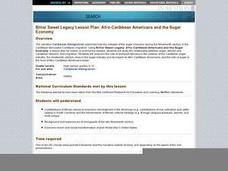Teaching Tolerance
Jim Crow as a Form of Racialized Social Control
Just because slavery was illegal doesn't mean it went away ... Jim Crow Laws took its place. An eye-opening lesson focuses on how Jim Crow Laws were used as a form of racial social control against African Americans in the United States....
Teaching Tolerance
The War on Drugs—Mechanisms and Effects
The war on drugs doesn't have definite results. An interesting lesson examines the social, political, and economic effect of the war on drugs. Academics learn how the war on drugs has led to mass incarcerations and negatively affected...
US House of Representatives
“The Fifteenth Amendment in Flesh and Blood,” The Symbolic Generation of Black Americans in Congress, 1870–1887
The reading of a contextual essay launches a study of Black Americans who served in Congress from 1870 through 1887. Young historians identify the African Americans who served during this period, investigate the ways they won national...
Center for History Education
Did Southern Free Men of Color Fight for the Ideals of the South?
Much of history is distasteful. Primary sources often reveal attitudes acceptable at the time that no longer are. But to understand controversial historical events, historians must examine primary sources that represent a wide variety of...
National Endowment for the Humanities
Frances Ellen Watkins Harper’s “Learning to Read”
Frances Ellen Watkins Harper's poem "Learning to Read" is the focus of a lesson that teaches middle schoolers how to do a close reading of a text. The lesson introduces them to a brief biography of the poet, includes a video reading, and...
Curated OER
History: Robert Gould Shaw and the 54th Massachusetts
Students read a letter by Shaw to his wife after the Union raid at Darien, Georgia; then will draw conclusions about it. Students debate about the Emancipation Proclamation as well as the possibility of allowing blacks to serve in the...
Curated OER
After the Civil War: Segregation
Students study the Civil War. In this American history lesson, students define segregation, make a segregation collage with pictures of people being separated from others because of their race, religion, or ethnic background, and write...
Curated OER
Freedom for All? The Contradictions of Slavery and Freedom in the Maryland
Students are be able to analyze the contrast between the rights and privileges referenced in the Declaration of Independence and the Maryland State Constitution in comparison to the rights and privileges of slaves. They are be able to...
Curated OER
Afro-Caribbean Americans and the Sugar Economy
Students read the narrative, Caribbean Immigration and examine how sugar production and migration of people of African origin have been intertwined for centuries. Working in three groups, they present oral reports on the three eras of...
Curated OER
Black Americans in Delaware from 1639 to the Present: An Overview
Students complete matching activities and write an essay about Black Americans in Delaware from 1639.
Curated OER
The Civil War: A Nation Divided
Discuss the differences between the North and the South and how those differences led to the Civil War. Middle schoolers examine and analyze a famous speech or writing by President Lincoln in order to better understand the speaker's...
Curated OER
Heroes in Art
Students examine the life, portraits and speeches of Frederick Douglass. They consider what made his speeches effective and why he is regarded as a national hero. They write an original speech.
Curated OER
The Life of Harriet Tubman
A well-designed lesson teaches about the history of Harriet Tubman, the Underground Railroad, and the issues of civil liberties. Young historians watch a video, access Internet resources, and engage in cooperative activities which should...
Curated OER
Abraham Lincoln and Frederick Douglass: A Compare and Contrast Lesson Plan
Two great men, one time period, and one purpose; it sounds like a movie trailer, but it's not. It's a very good comparative analysis lesson focused on Abraham Lincoln and Frederick Douglass. Learners will research and read informational...
Library of Virginia
An Overview of American Slavery
The final lesson in a unit study of American slavery asks young historians to synthesize what they have learned about how slavery in America changed over time. Revisiting the many documents they have examined, they consider the economic,...
Curated OER
What Events Led to Lincoln's Assassination?
Fourth graders use primary and secondary sources to research the assassination of Abraham Lincoln. They identify arguments supporting and opposing the position that Lincoln's assassination could have been prevented and write a report...
Curated OER
Civil War Prison Camps
Fourth graders work with a partner to create a puppet show that demonstrates the condition of the prisoners in Andersonville, Georgia during the Civil War.
Curated OER
Writing Exercises: Science and Technology II
All revolutions in science and technology have both pros and cons. Kids examine the advent of the green revolution, nuclear growth, use, and the countries that are considered nuclear powers. They'll construct three responses to each of...
Museum of Tolerance
The Pursuit of Democracy and Diversity: The Trial of Pro-Social Injustice in Historical Documents and Accounts
Class members investigate The Indian Removal Act of 1830, U.S. Theft of Mexican Territory Timeline, and President Abraham Lincoln’s letter to Horace Greeley, 1862, and then conduct a mock trial of each of these documents to determine...
University of California
The Civil War: Lincoln’s Speeches
Abraham Lincoln is responsible for uniting the states during the most tumultuous periods in American history, and for his elegant oratory that kept the Union believing in its cause. Young histoians analyze various speeches by America's...
Curated OER
If You Lived at the Time of the Civil War.
Students investigate major characters of history that are represented in children's literature. They conduct research using a variety of resources and each character is put into a class book as a presentation. The character includes a...
Curated OER
Abraham Lincoln and the Arts
Students engage in a study of history and how the figure of Abraham Lincoln has evolved into a national cultural icon. They discuss the importance of his life and how he influenced the political landscape of America in the past and present.
Curated OER
Before Rosa Parks: Ida B. Wells
The contributions of Ida B. Wells to the Civil Rights Movement are the focus of this social studies lesson. Middle schoolers read a handout regarding Wells, discuss the handout, and write about non-conformist behavior.
Roy Rosenzweig Center for History and New Media
Reward: Valuable Slaves
To gain insight into the American institution of slavery and how African Americans were viewed during this time, groups examine run-away slave ads and slave auction broadsides. Teams use the provided worksheet to record their impressions...

























